Key takeaways:
- Community forums facilitate exchange and foster a sense of belonging, encouraging shared responsibility towards wildlife conservation.
- Wildlife conservation is crucial for ecological balance, human health, and preserving cultural heritage; every species plays a role in the ecosystem.
- Engaging in forums leads to actionable insights, empowering individuals to organize local conservation efforts, share stories, and advocate for wildlife protection.
- Personal experiences and grassroots activism in conservation inspire collective action and highlight the challenges of balancing community needs with wildlife preservation.
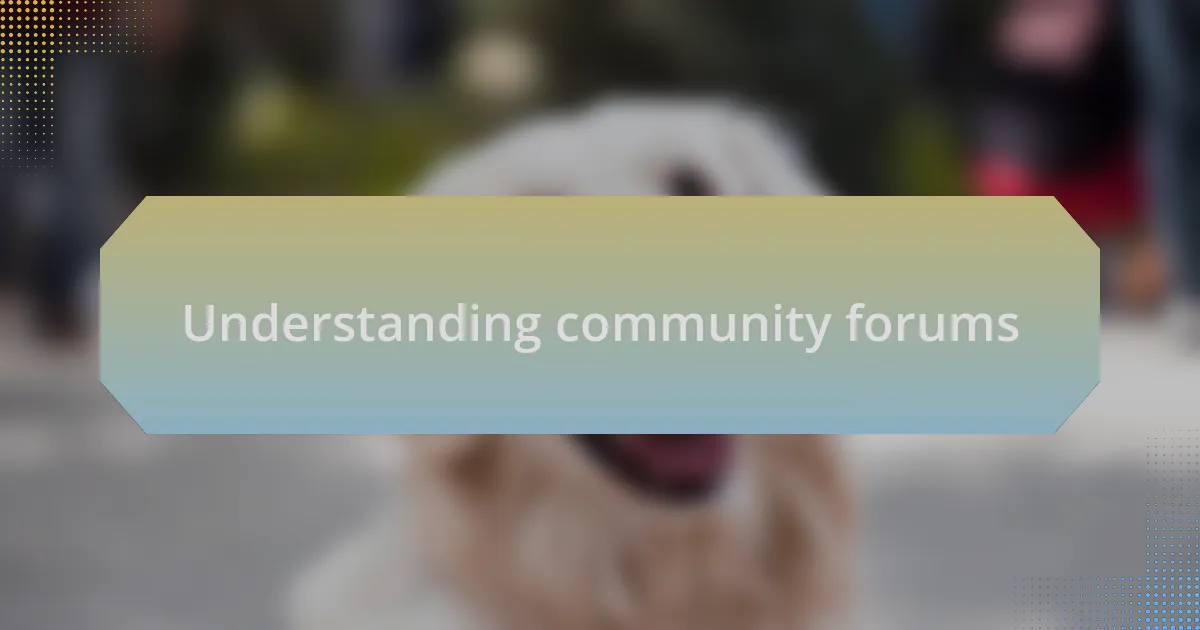
Understanding community forums
Community forums are incredible spaces for exchange and engagement, offering a platform where passionate individuals come together around shared interests. I remember the first time I posted in one; I was nervous, wondering if my thoughts would resonate with anyone. To my surprise, I received warm encouragement that made me realize how supportive these communities can be.
One of the most appealing aspects of community forums is the diversity of voices and ideas. People from different backgrounds and experiences contribute unique perspectives that can challenge our thinking. Have you ever found yourself questioning your own beliefs after reading a post? I certainly have. It’s fascinating how a single comment can spark a deeper curiosity, leading to hours of research and discussion.
Moreover, community forums foster a sense of belonging. When I participated in discussions about endangered species, I felt connected to others who cared deeply about the same issues. This creates not just a community but a sense of shared responsibility. Isn’t it rewarding to know that you’re part of a bigger movement, even if it’s just through a screen?
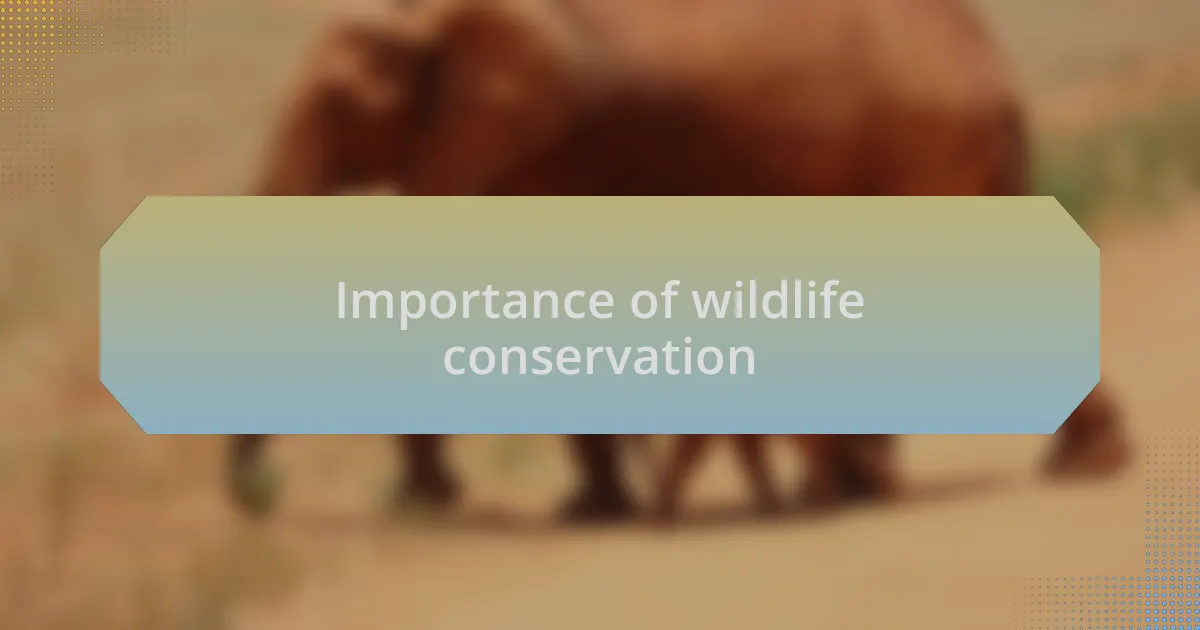
Importance of wildlife conservation
Wildlife conservation is vital because it ensures the health of our ecosystems. I remember my first trip to a national park, where I was mesmerized by the variety of species coexisting in harmony. Seeing how each animal played a role in the environment made me realize that every species, no matter how small, contributes to the larger picture of ecological balance. Without conservation efforts, we risk losing those delicate relationships that sustain our natural world.
Protecting wildlife also means safeguarding our own future. I often think about how many medicinal breakthroughs we owe to the biodiversity found in nature. One time, I learned about an endangered plant species that held the key to a new cancer treatment. It struck me that by preserving wildlife, we are not just protecting animals; we are potentially saving human lives. Isn’t it critical for us to maintain that connection to the wild for the benefit of all species, including ourselves?
Furthermore, wildlife conservation is about preserving our cultural heritage. I’ve spoken with indigenous communities who emphasize their relationship with the land and animals. Their deep-rooted traditions highlight the intrinsic value of wildlife that transcends mere survival. It makes me wonder: what stories will future generations miss out on if we lose these species? Engaging in conservation is not just an environmental issue; it’s a moral imperative to honor these connections.
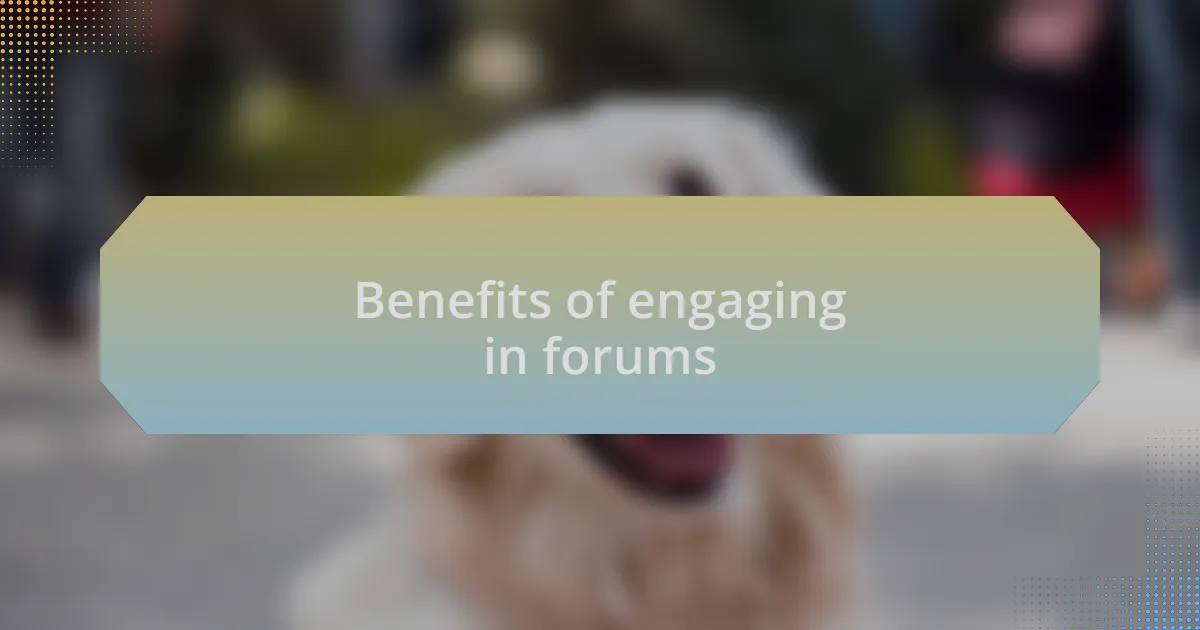
Benefits of engaging in forums
Engaging in community forums centered around wildlife conservation creates an invaluable opportunity for learning and exchanging ideas. I once participated in a discussion where a seasoned conservationist shared their firsthand experiences with habitat restoration. Hearing their stories not only broadened my understanding but also sparked my motivation to get involved locally. It’s incredible how a simple conversation can ignite passions and inspire action, isn’t it?
Moreover, forums provide a platform for building a supportive network of like-minded individuals dedicated to wildlife preservation. I recall meeting someone through a forum who turned out to be a local volunteer coordinator. This connection led me to participate in a tree-planting event that made a tangible difference in our community. The shared enthusiasm in these spaces fosters a sense of belonging that can be instrumental in sustaining one’s efforts in conservation.
Lastly, engaging in forums allows for the dissemination of crucial information in real-time. For example, I once learned about a sudden decline in a local bird population through a forum post. This immediate awareness empowered me and my neighbors to take swift action, ultimately rallying resources for research and rehabilitation. Isn’t it amazing how the collective knowledge of passionate individuals can drive impactful change?
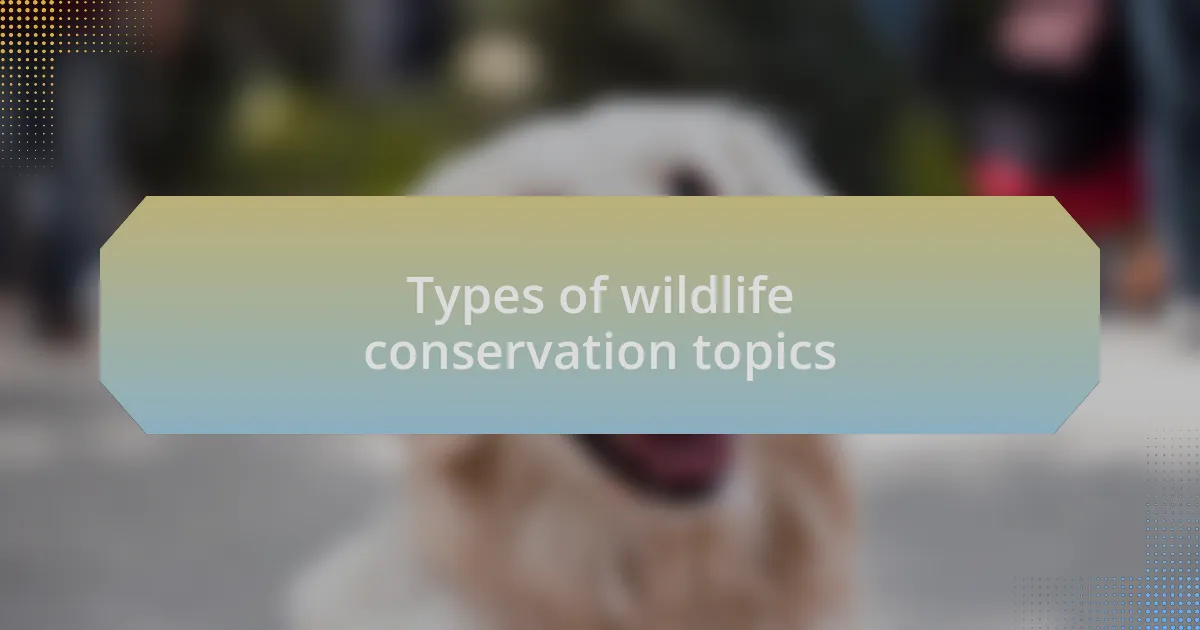
Types of wildlife conservation topics
When diving into wildlife conservation topics, it’s fascinating to see the variety that emerges within community discussions. From the impacts of climate change on habitat loss to the importance of preserving endangered species, each thread reveals unique perspectives and insights. I remember reading a compelling post about the delicate balance of ecosystems, where the writer explained how removing a single species can trigger a cascade of effects. It left me pondering: how interconnected are we with the wildlife around us?
Another prevalent topic often tackled in forums is the role of community-led conservation efforts. I once engaged in a discussion focused on a local initiative aimed at protecting wetlands. Through members’ shared experiences, I learned about the innovative techniques they implemented to involve schools in educational programs. That moment made me realize: sometimes, the most local actions can have rippling effects that resonate much further than expected.
Additionally, forums frequently highlight the significance of policy and advocacy in wildlife conservation. For instance, I recall a spirited debate regarding new legislation aimed at protecting marine life. The passionate arguments led me to reflect on my own role in advocating for policy changes. It’s inspiring how community members push each other to become more informed and engaged citizens, fueling the larger movement for wildlife protection.
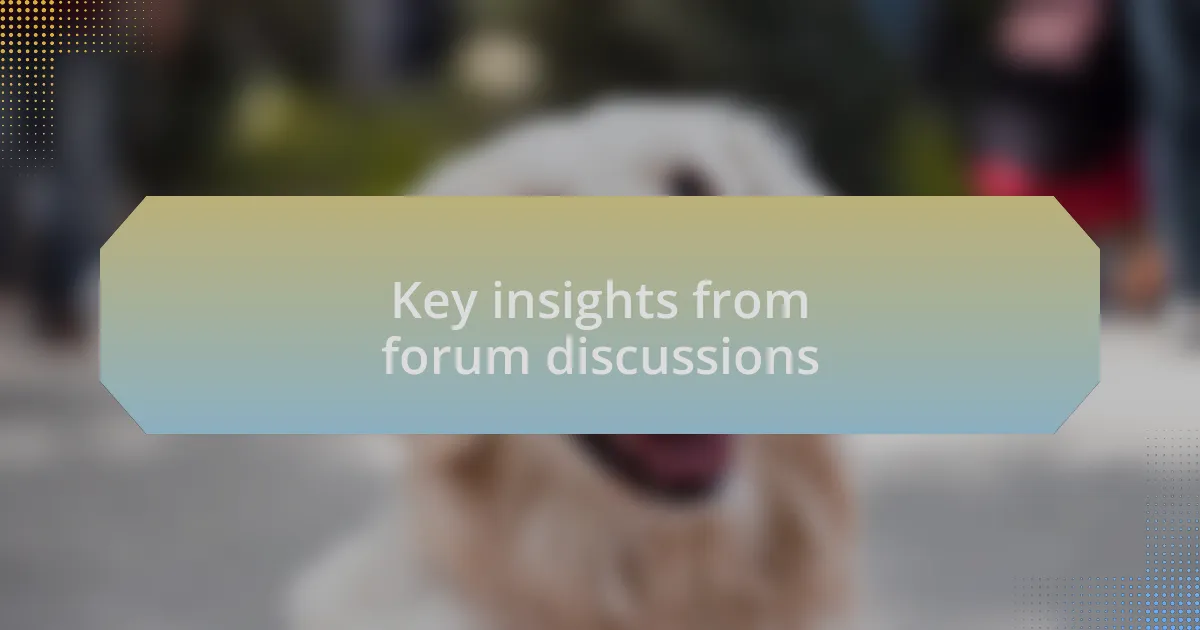
Key insights from forum discussions
In the discussions I’ve observed, one key insight revolves around the power of storytelling in fostering connections between community members and wildlife. A participant shared a touching story about their childhood experiences visiting a nearby forest, describing how witnessing a family of deer inspired their lifelong commitment to conservation. It really struck me; how many of us have our own stories that could ignite passion in others? Sharing personal narratives seems to transform abstract conservation ideas into relatable and motivating experiences.
Another fascinating takeaway centers on the diverse approaches to grassroots activism. During a recent forum chat, someone recounted their journey of organizing a beach cleanup, emphasizing how personal commitment can spark collective action. This really resonated with me; the idea that one person’s efforts can inspire an entire community encourages me to think of ways I can contribute too. Could our small actions be the catalyst for broader change in our environments?
Additionally, I’ve noticed that conversations often bring to light the challenges of balancing conservation efforts with local needs. A forum member recounted the tension in their community over land use, where agricultural interests sometimes clash with wildlife habitats. This discussion made me reflect: how can we find harmony in our priorities? It’s evident that such dialogues are essential for finding common ground, as they open the door to innovative solutions that benefit both people and wildlife.
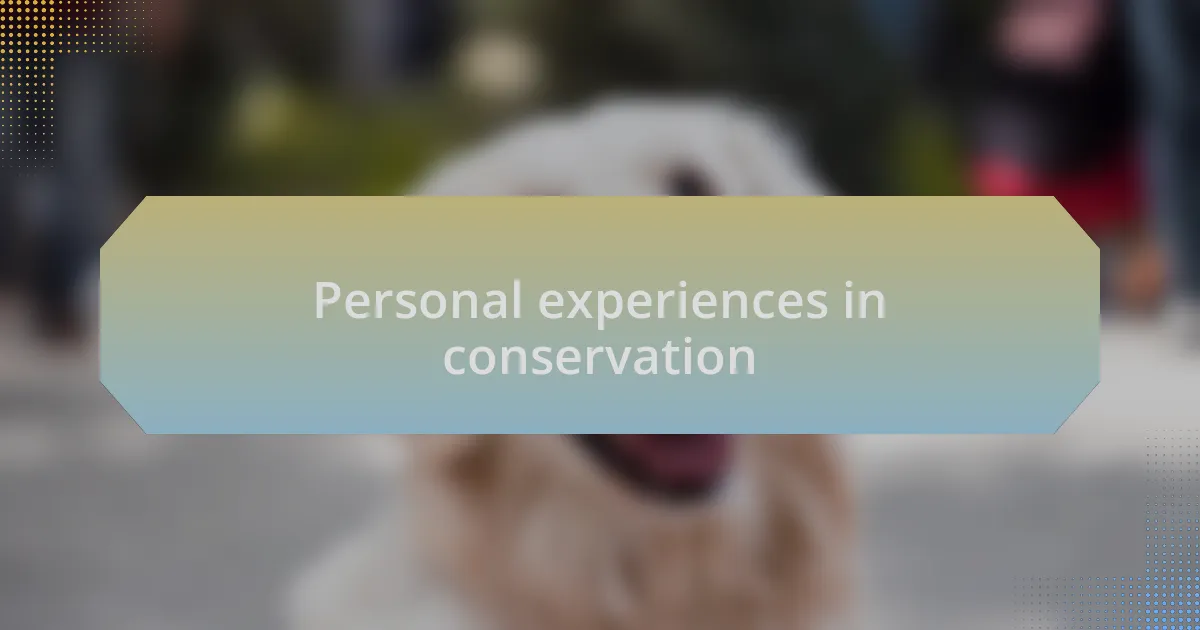
Personal experiences in conservation
Reflecting on my own conservation journey, I remember the first time I volunteered for a reforestation project. As I dug into the soil and planted young saplings, I felt an overwhelming sense of purpose, watching my small contributions ripple through the community. Have you ever realized how even a seemingly simple act can forge a profound connection with nature?
Another moment that stands out is when I participated in a wildlife monitoring initiative. While observing the majestic movements of local birds, I felt a deep sense of responsibility for their habitat. It made me think: what would happen if we all took a moment to appreciate the ecosystems around us? Those experiences deepened my understanding of conservation and our role within it.
I can’t forget the discussions I had with fellow conservationists over coffee. One friend shared their struggle to rally support for a local campaign aimed at protecting fragile wetlands. I was moved by their dedication and felt a sense of urgency—how can we communicate the importance of these ecosystems to those who may not see their value? These intimate exchanges drive home the idea that personal experiences in conservation matter; they enrich our understanding and create a tapestry of collective action.
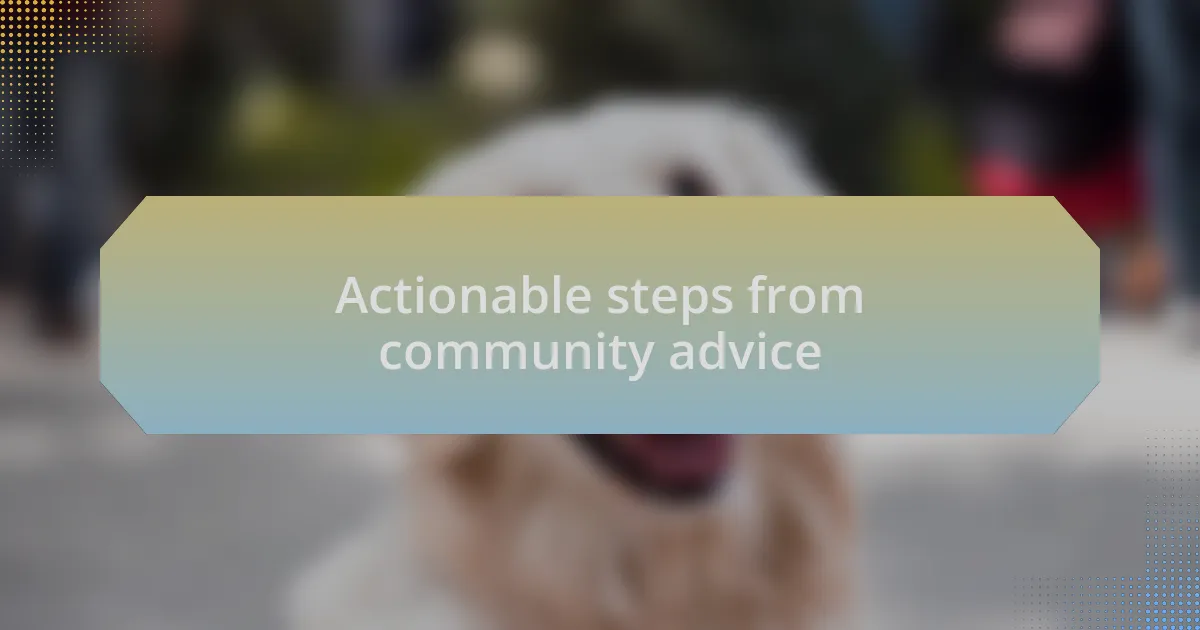
Actionable steps from community advice
Community forums often serve as a treasure trove of actionable advice for wildlife conservation. One memorable piece of advice I received was about organizing local clean-up events, a simple yet impactful way to engage the community. It reminded me of a day when I joined others to clear trash from a nearby riverbank; the exhilaration of a tangible difference invigorated both the environment and our group spirit. Have you ever experienced that satisfying moment when effort aligns with purpose?
Another suggestion that resonated with me was to advocate for local wildlife education programs in schools. I recall visiting a classroom where students were captivated by a presentation on endangered species. Their wide-eyed curiosity at the presentation fueled my belief that we can plant seeds of passion for conservation in the next generation. How often do we underestimate the power of educating young minds?
I also came across advice encouraging folks to use social media to spread awareness about conservation issues. Inspired by that, I started sharing my adventures and the challenges wildlife faces in my area. One post sparked a conversation that led to a collaborative project with neighbors, aiming to protect a local habitat. Have you thought about how your online presence could mobilize others for conservation action?